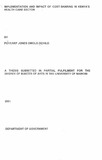| dc.description.abstract | Introduction
The basic aim of this study is to examine the Role of Information in the
Implementation of Cost-Sharing in Kenya's Health Service Sector, specifically
among the middle income groups and the low income slum dwellers in Nairobi.
Since the attainment of independence, in 1963, the Kenya Government health care
Policy was not based on Cost-Sharing per se. Rather, the government subsidized
heavily both health care programmes and education.
However, this policy was changed in 1989 when the Government adopted the
Cost-Sharing Policy as a component of the Structural Adjustment Programmes
demanded by both the World Bank and the International Monetary Fund.
METHODOLOGY
In studying the government's policy of Cost-Sharing in Health Service Sector,
we conducted field work in Nairobi between February and November, 1993. Our
study sample comprized of 194 respondents of whom 67 were middle income
government employees. The remaining 127 were drawn from the low income slum
dwellers in Kibera.
The respondents were purposively chosen. A prepared questionnaire was
administered to all the 194 respondents and the results computerized and analyzed.
The study also used secondary library data as well as results from oral interviews.
FINDINGS
Our findings revealed that the new government policy of Cost-Sharing in
Health Service Sector has not fully addressed the health needs nor has it solved
health problems of the slum dwellers in Kibera, Nairobi, where the field work for the
study was done. It is evident from our field data that contrary to the assumptions of
planners of the World Bank, the International Monetary Fund and the Kenya
Government, the envisaged successful outcomes from the implementation of Cost-
Sharing in Health Care Services Sector have not been forthcoming.
On the contrary, evidence shows that the programme is adversely affecting
the vulnerable groups, the poor, particularly children and women more than was
anticipated initially. The programme seems to favour the high income members of
our society who can afford the high cost of treatment. Whereas, the low income
groups as we discuss in chapter three tend to seek other forms of treatment such as
going to herbalists and other forms of traditional treatments.
POLICY IMPLICATIONS
Arising from our study of the Implementation and Impact of Cost-Sharing in
Kenya's Health Care Sector; we have identified four key areas that have critical
policy implications to the Government of Kenya. These areas include :-
(i) The early failure of the Government of Kenya, The World Bank and
International Monetary Fund to integrate Poverty as part of the Structural
Adjustment Reforms. Yet, poverty related concerns are extremely crucial in
ensuring the success or failure of the implementation of the Structural
Adjustment Reforms, more so the reforms that rely on the implementation of
Cost-Sharing such as Health and Education. (ii) The inability of the Government
of Kenya to address conclusively the issues of Equity and Access to health services
through Cost-Sharinq, This is critical given the current Regional and National
disparities with regards to Equity and Access to health care services and needs in
Kenya. (iii) The problems arising from lack of adequate financial resources at the
disposal of the government and the technical expertise; both of which are critical in
the successful implementation of Cost-Sharing in health. (iv) Finally, the lack of
adequate, relevant, appropriate and accurate information on health in general and in
Cost-Sharing in particular have serious policy implications relating to the
implementation of cost-sharing in health in Kenya. These policy implications are
discussed in great detail in chapter five. | en |

